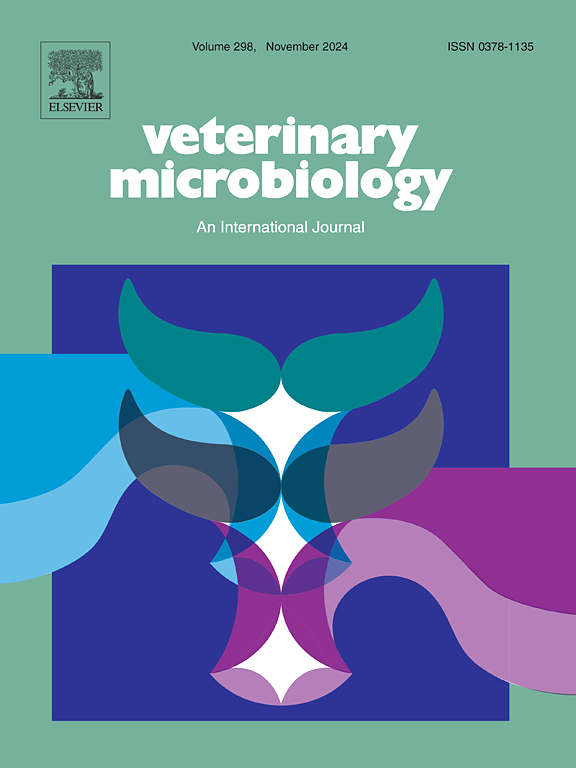NR4A1 mediates PRRSV-induced ileal injury in piglets by transcriptional regulation of NLRP3
IF 2.7
2区 农林科学
Q3 MICROBIOLOGY
引用次数: 0
Abstract
Porcine reproductive and respiratory syndrome virus (PRRSV) infection poses a serious threat to swine health, with ileal injury representing a key pathological manifestation. However, the role of nuclear receptor NR4A1 in PRRSV-induced ileal damage remains unclear. This study investigated the relationship between PRRSV-induced ileal injury and nuclear receptor NR4A1. Our results demonstrate that PRRSV infection induces inflammatory responses, leading to reduced growth performance and intestinal damage in piglets. Mechanistically, PRRSV-triggered inflammation causes pyroptosis in ileal cells, as evidenced by: (1) elevated serum levels of metabolic markers including diamine oxidase, D-lactate and intestinal fatty acid-binding protein; and (2) upregulated transcriptional expression of pyroptosis-related genes,including-NOD-like receptor family pyrin domain-containing 3 (NLRP3), interleukin-1β (IL1β), interleukin-18 (IL18), apoptosis-associated speck-like protein containing a CARD (ASC), gasdermin D (GSDMD), and caspase-1 (CASP1). These findings confirm the crucial role of pyroptosis in PRRSV-mediated ileal inflammatory injury. Importantly, we found that PRRSV activates the nuclear receptor NR4A1, which in turn upregulates the expression of NLRP3 in the pyroptosis pathway. This study provides the first evidence that nuclear receptor NR4A1 mediates PRRS-induced pyroptosis in piglet ileum through transcriptional regulation of NLRP3.
NR4A1通过转录调控NLRP3介导prrsv诱导的仔猪回肠损伤
猪繁殖与呼吸综合征病毒(PRRSV)感染严重威胁着猪的健康,而回肠损伤是其重要的病理表现。然而,核受体NR4A1在prrsv诱导的回肠损伤中的作用尚不清楚。本研究旨在探讨prrsv诱导的回肠损伤与核受体NR4A1的关系。我们的研究结果表明,PRRSV感染诱导炎症反应,导致仔猪生长性能下降和肠道损伤。在机制上,prrsv引发的炎症导致回肠细胞焦亡,其证据如下:(1)血清代谢标志物水平升高,包括二胺氧化酶、d-乳酸和肠脂肪酸结合蛋白;(2)凋亡相关基因转录表达上调,包括nod样受体家族含pyrin结构域3 (NLRP3)、白介素-1β (il -1β)、白介素-18 (il -18)、含有CARD的凋亡相关斑点样蛋白(ASC)、gasdermin D (GSDMD)和caspase-1 (CASP1)。这些发现证实了焦亡在prrsv介导的回肠炎症损伤中的关键作用。重要的是,我们发现PRRSV激活核受体NR4A1,这反过来又上调NLRP3在焦亡途径中的表达。本研究首次证实核受体NR4A1通过NLRP3的转录调控介导prrs诱导的仔猪回肠焦亡。
本文章由计算机程序翻译,如有差异,请以英文原文为准。
求助全文
约1分钟内获得全文
求助全文
来源期刊

Veterinary microbiology
农林科学-兽医学
CiteScore
5.90
自引率
6.10%
发文量
221
审稿时长
52 days
期刊介绍:
Veterinary Microbiology is concerned with microbial (bacterial, fungal, viral) diseases of domesticated vertebrate animals (livestock, companion animals, fur-bearing animals, game, poultry, fish) that supply food, other useful products or companionship. In addition, Microbial diseases of wild animals living in captivity, or as members of the feral fauna will also be considered if the infections are of interest because of their interrelation with humans (zoonoses) and/or domestic animals. Studies of antimicrobial resistance are also included, provided that the results represent a substantial advance in knowledge. Authors are strongly encouraged to read - prior to submission - the Editorials (''Scope or cope'' and ''Scope or cope II'') published previously in the journal. The Editors reserve the right to suggest submission to another journal for those papers which they feel would be more appropriate for consideration by that journal.
Original research papers of high quality and novelty on aspects of control, host response, molecular biology, pathogenesis, prevention, and treatment of microbial diseases of animals are published. Papers dealing primarily with immunology, epidemiology, molecular biology and antiviral or microbial agents will only be considered if they demonstrate a clear impact on a disease. Papers focusing solely on diagnostic techniques (such as another PCR protocol or ELISA) will not be published - focus should be on a microorganism and not on a particular technique. Papers only reporting microbial sequences, transcriptomics data, or proteomics data will not be considered unless the results represent a substantial advance in knowledge.
Drug trial papers will be considered if they have general application or significance. Papers on the identification of microorganisms will also be considered, but detailed taxonomic studies do not fall within the scope of the journal. Case reports will not be published, unless they have general application or contain novel aspects. Papers of geographically limited interest, which repeat what had been established elsewhere will not be considered. The readership of the journal is global.
 求助内容:
求助内容: 应助结果提醒方式:
应助结果提醒方式:


